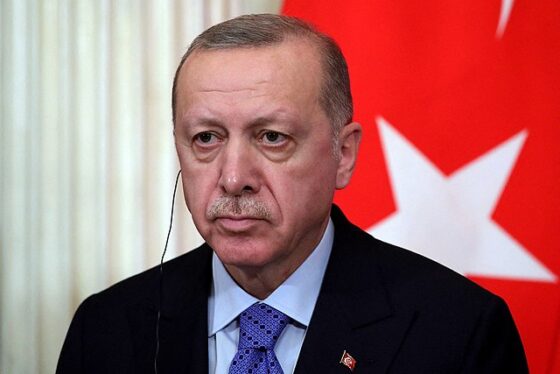By Burak BekdilJune 21, 2021

BESA Center Perspectives Paper No. 2,077, June 21, 2021
EXECUTIVE SUMMARY: Power fatigue per se does not fully explain the decline of Recep Tayyip Erdoğan. He will have a hard time uniting a majority of Turks around the flag and the mosque in the presidential elections of 2023.
The Turkish Islamists’ first experience of long-term governance, now in its 19th year, has turned the country into a caricature.
With annual inflation and interest rates nearing 20%, youth unemployment at 30%, and annual per capita income having fallen to barely $7,500, the popularity of President Recep Tayyip Erdoğan is facing an unprecedented decline. Pollsters released new data that for the first time put his approval rating at below 30%. According to the research house MetroPOLL, 46.5% of Turks say they would never vote for Erdoğan versus 35.3% in December 2019.
“This is not the Turkey we dreamed of,” one close Erdoğan aide, and a co-founder of Erdoğan’s Justice and Development Party (AKP), told BESA Perspectives in unexpectedly brave remarks. The spiral of mismanagement has been running at full speed, at times astonishing even Erdoğan loyalists. Turks cannot decide whether to laugh or cry over several cases that hit the headlines within the span of only one month.
COVID relief
Cem Emre Akıncı, a restaurant owner in Kuşadası on the Aegean coast, applied to a special government relief program that offered cash support for small businesses affected by COVID-19. Akıncı completed his application, containing all the documents necessary to qualify for the support. Erdoğan’s government received the application and made a deposit into his account of 4.63 Turkish liras, or $0.56. “I hope this much money,” Akıncı drolly commented, “will not ruin my moral compass.”
Stealth alcohol ban
The Ankara government announced on April 29 that it would apply full lockdown rules until May 17. Then, in a move that displayed its usual Islamist reflex, it added alcoholic beverages to a list of commodities banned from sale on supermarket shelves. As analysts attempted to grasp the logic of linking alcohol consumption to COVID-19 (cigarette sales were free), the government announced a list of other commodities inexplicably placed on the ban list in an apparent attempt to camouflage its Islamist motives: porcelain, cutlery, kitchenware, toys, DIY materials, stationery, home textiles, garden furniture, and car accessories.
Shutting down the Supreme Court
At the beginning of May, Erdoğan’s coalition partner, ultranationalist leader Devlet Bahçeli, announced his proposals for a new Constitution. “This constitutional proposal is the democratic torch of the 100 years that lies ahead, a move by our people to build and reclaim the future,” Bahçeli proudly announced. Except that one of his 100 constitutional proposals is to shut down the Supreme Court.
Service passports for human smuggling
The German authorities have undertaken an investigation into hundreds of Turkish nationals suspected of entering German territory on illegally obtained service passports. This “grey” passport allows visa-free entry to many countries and is usually issued to national athletes or government workers who need to be abroad to carry out their duties.
It appears that some municipalities controlled by the AKP provided hundreds of grey passports to party loyalists or sold them to family and friends who used them to emigrate to EU countries, mainly Germany.
“Think about a state,” wrote columnist Mehmet Y. Yılmaz, “… whose official service passport is now a source of suspicion at immigration gates abroad.”
Scientists cannot publish data
It is an open secret that Turkey’s official statistics agency, TUIK, has long published doctored inflation figures in order to avoid stoking public discontent against the government. Economists say the country’s actual inflation rates are at least twice the official numbers. As accusations of underreporting price data peaked, an independent inflation research group, ENAGroup, started publishing its own data in September.
In May, TUIK filed a criminal complaint against ENAGroup for publishing alternative data on inflation. The government office demanded that ENAGroup be fined for “purposefully defaming” the official statistics institution and “misguiding public opinion.”
“For the first time in the history of the Turkish Republic,” Treasury and Finance Minister Lütfi Elvan said, “the group aims to ‘damage and discredit the Turkish Statistical Institute’ by spreading misleading data that are used by opposition parties.”
Disrespecting a sultan’s tomb
Ever since opposition figure Ekrem Imamoğlu won the Istanbul mayoral race in 2019, ending the Islamists’ 25-year rule in Turkey’s biggest city, he has been the focus of ire from senior government figures, including Erdoğan himself. The central government suspended Imamoğlu’s charity campaigns, including cheap bread sales to the poorest.
In the latest episode, the Interior Ministry launched an investigation into Imamoğlu for “disrespecting Sulhan Mehmet II’s tomb”—the resting place of the Ottoman sultan who conquered Istanbul in 1453. A probe was opened and the mayor of Istanbul was summoned to make a statement.
How did this offense take place? In 2020, Imamoğlu visited the tomb and was photographed with his hands folded behind his back.
“In my opinion,” Interior Minister Süleyman Soylu said, “This [behavior] is an offense.”
“I feel so much shame on the minister’s behalf,” replied Imamoğlu.
Every day, more and more Turks are joining the ranks of the opposition. There is more to Erdogan’s decline than power fatigue. He will find it very difficult to unite a majority of Turks around the flag and mosque in the presidential elections of 2023.
Burak Bekdil is an Ankara-based columnist. He regularly writes for the Gatestone Institute and Defense News and is a fellow at the Middle East Forum.



